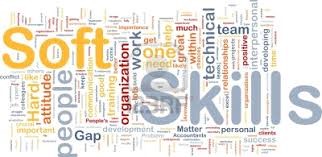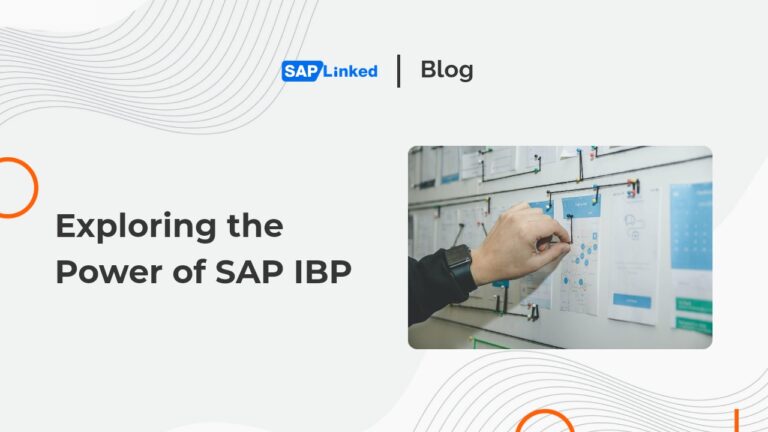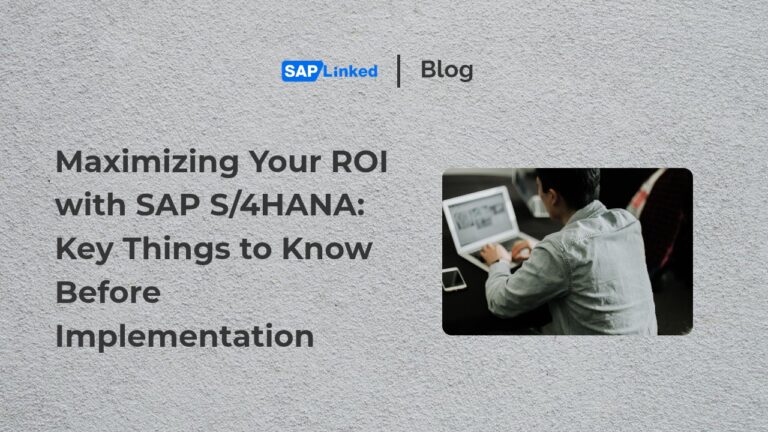Effective Tips for Conducting SAP Consultant Interviews | Expert Insights from Saplinked
When it comes to hiring SAP consultants, the interview process can be tricky, especially if the interviews are conducted in English as a second language. However, conducting interviews effectively is crucial to ensure that you’re hiring the right person for the job. In this blog post, we’ll discuss tips and strategies on how to conduct SAP consultant interviews in English to achieve optimal results. Whether you’re an HR professional or a business manager responsible for hiring SAP consultants, this guide will help you navigate through the interviewing process confidently and efficiently. So, let’s dive in!
- 1. The Importance of Researching the SAP Job
- 2. How to Tailor Interview Questions
- 3. Key Interview Questions for SAP Consultants
- 4. Guidelines for Conducting Face-to-Face Interviews
- 5. Understanding SAP Products and Services
- 6. Reviewing Previous Work Experience
- 7. Project management & Planning skills
- 8. Key Skills required for the job
- 9. The Role of Communication Skills
- 10. Conclusion
1. The Importance of Researching the SAP Job
Research is an essential part of any successful SAP consultant interview. As discussed earlier, it is important to understand the job in detail to tailor the interview questions accordingly. Researching the job involves gathering information about SAP products and services, understanding the skills required for the job, and reviewing the previous work experience of the candidate.
The interviewers must research the company and its SAP projects to assess if the candidate can contribute to the success of the project. They should also familiarize themselves with the company’s core values and culture to determine if the candidate would fit in with the team.
Another critical aspect of researching the SAP job is identifying the specific skills required for the role. This involves identifying the technical and business skills required, such as project management and planning skills, as well as communication skills.
Ultimately, the importance of researching the SAP job cannot be overstated. It is necessary to ensure that the interviewer selects a candidate who has the right set of skills, experience, and values to contribute to the company’s success. Therefore, interviewers must take the time to research and understand the SAP job before conducting the interview.
2. How to Tailor Interview Questions
Once a hiring manager has researched the SAP job requirements thoroughly, the next step is to tailor the interview questions to assess the candidate’s skills and knowledge accurately. The tailored interview questions must elicit detailed responses that illustrate the candidate’s expertise in SAP consulting. Such questions must go beyond the general questions about SAP and target specific areas that relate to the job requirements.
For example, during the interview, the hiring manager can ask the candidate to provide examples of successful SAP implementations or the candidate’s experience in delivering SAP consulting services within a specific industry. They can also ask the candidate about their understanding of the SAP ecosystem or the specific SAP modules that they are required to work on.
By tailoring the interview questions, the hiring manager can focus on the areas that matter most to the job, thereby avoiding generic or irrelevant interview questions. This approach helps the hiring manager to gain a deeper understanding of the candidate’s knowledge, skills, and expertise, enabling them to make an informed decision.
Moreover, when tailoring interview questions, the hiring manager can assess the candidate’s problem-solving abilities by asking them to provide solutions to SAP-related issues. Such questions enable the hiring manager to see how the candidate thinks, their methodology in problem-solving, and their approach to dealing with complex SAP-related issues.
In summary, by tailoring the interview questions, the hiring manager can gauge the candidate’s expertise, skills, and knowledge more accurately, making it easier to determine whether they are the right fit for the job. This approach also illustrates the company’s commitment to selecting the best candidates, which can attract top-tier SAP consultants to join the company.
3. Key Interview Questions for SAP Consultants
The success of any SAP implementation project largely depends on the knowledge and expertise of SAP consultants. Conducting effective interviews is essential to finding candidates with the right skills and experience for the job. Here are some key interview questions for SAP consultants to help employers make informed hiring decisions.
First, it is important to assess the candidate’s technical expertise in SAP. Typical questions include: “What experience do you have in SAP implementation and support?” and “Can you explain how you would handle a specific SAP issue?” Employers may also ask the candidate to demonstrate their knowledge of specific SAP products or modules.
In addition to technical knowledge, it’s important to assess the candidate’s soft skills. Teamwork, problem-solving, and communication skills are all essential in SAP implementation projects. Employers might ask questions like: “Can you describe a time when you had to work collaboratively with a team to solve a problem?” or “How do you communicate complex technical issues to non-technical stakeholders?”
Finally, it’s important to assess the candidate’s project management skills. SAP implementation projects are complex and involve multiple stakeholders, so effective project management is essential. Employers may ask candidates to describe their approach to project planning, risk management, and milestone tracking.
By asking these key interview questions, employers can identify candidates with the right technical expertise, soft skills, and project management skills for SAP implementation projects.

4. Guidelines for Conducting Face-to-Face Interviews
When it comes to conducting face-to-face interviews with SAP consultants, there are certain guidelines that are essential to follow. These guidelines not only help the interviewer to effectively assess the candidate, but also ensure the process is professional and streamlined. Here are some key guidelines to keep in mind when conducting face-to-face interviews:
1. Start with an introduction: Begin the interview by introducing yourself and explaining the purpose of the interview. Make the candidate feel welcome and comfortable before diving into the questions.
2. Use open-ended questions: During the interview, it’s important to ask open-ended questions to encourage the candidate to provide detailed responses. These types of questions can also help uncover hidden skills and experiences.
3. Focus on behavior-based questions: Use behavior-based questions to assess how the candidate would handle specific situations they would likely encounter in the role. This approach can provide insight into the candidate’s problem-solving skills, communication abilities, and how they work within a team.
4. Conduct a skills assessment: Provide the candidate with a small task or exercise that will allow them to demonstrate their SAP skills. This can help validate their experience and knowledge.
By following these guidelines, the interviewer can effectively assess the SAP consultant candidate and make an informed hiring decision. The previous blog sections, such as researching the job and understanding SAP products and services, can also be helpful in creating tailored interview questions and assessing the candidate’s experience in relation to the job. Overall, a professional and focused approach to conducting face-to-face interviews can greatly benefit the hiring process.

5. Understanding SAP Products and Services
After researching the SAP job and tailoring interview questions that assess a candidate’s technical skills and experience, it is also important to understand SAP products and services.
SAP offers a range of enterprise resource planning (ERP) solutions and software, as well as enterprise software for supply chain management, customer relationship management, and other functions. As such, it is essential that SAP consultants understand the nuances of these solutions and are able to explain them to clients and colleagues.
During the interview process, it is important to ask questions that assess a candidate’s knowledge of SAP products and services. For example, you can ask about the different types of ERP solutions and their differences, the various SAP products available, and the services provided by SAP consultants.
Reviewing a candidate’s previous work experience can also provide valuable insight into their knowledge of SAP products and services. It is important to assess whether a candidate has worked on projects that involve SAP products and services, and if they have, to what extent.
In addition to technical knowledge of SAP products and services, it is also important for consultants to have project management and planning skills. This includes the ability to create project plans, prioritize tasks, and manage timelines.
Effective communication skills are also essential for SAP consultants. The ability to communicate technical information to clients, stakeholders, and team members in a clear and concise manner is critical for success in this field.
Overall, a successful SAP consultant must have a deep understanding of SAP products and services, combined with strong project management, planning, and communication skills. By asking targeted questions during the interview process, you can identify candidates who possess these essential skills and knowledge, and select the best fit for your organization.
6. Reviewing Previous Work Experience
When conducting an SAP consultant interview, reviewing previous work experience is an essential step in the process. This section focuses on evaluating the candidate’s past work experiences, which can provide valuable insight into their strengths, weaknesses and overall fit for the job.
To better assess the candidate’s experience, it is first important to establish key baselines for the SAP interview, even if it is already stated on the resume. The interviewer should quantify how much experience in time and number of projects, so as to better evaluate the depth and breadth of the candidate’s experience.
Next, the interviewer should check the skill set of the consultant to know the modules he/she is expertise in. The SAP certification is almost mandatory, so the interviewer should verify this to ensure that the candidate possesses the required qualification for the position.
It is important to note that interview preparation is also critical for the candidate. Hence, the interviewer should advise the candidate to be prepared for all basic questions and explain more about the project which they have done in their previous job.
In addition, the interviewer should focus on project management and planning skills, which are critical when working with SAP. The role of the consultant involves conducting daily status meetings and weekly status meetings with teams, as well as interacting with clients to convey work status and address issues.
Beyond technical ability, communication skills are also key, and the interviewer should evaluate the candidate’s ability to articulate their technical knowledge to different stakeholders, including clients, colleagues and management.
In conclusion, reviewing previous work experience is a crucial step in effectively conducting SAP consultant interviews. The interviewer should evaluate the candidate’s skill set, establish baselines, focus on project management and planning skills, as well as evaluate communication skills. By doing so, the interviewer can make informed decisions about candidates and ensure that the best fit candidate is chosen for the job.

7. Project management & Planning skills
In conducting an effective SAP consultant interview, it is crucial to assess the candidate’s project management and planning skills. This section will provide guidelines on how to evaluate these skills along with the previous sections covering researching the SAP job, tailoring interview questions, conducting face-to-face interviews, understanding SAP products and services, reviewing previous work experience, and identifying key skills required for the job.
When evaluating project management and planning skills, the interviewer should ask questions that assess the candidate’s ability to create work plans, reconcile expectations conflicts among stakeholders and communicate risks, issues, and project completion to the relevant parties. Additionally, the candidate should possess excellent analytical skills, attention to detail, and good project management capabilities. The interviewer should ask about the candidate’s experience with implementing SAP in previous projects and how they managed project timelines and resources.
It is important to note that successful SAP projects require collaboration and communication among team members, stakeholders, and end-users. Therefore, the candidate’s ability to communicate effectively is crucial. The interviewer should ask questions that assess the candidate’s communication skills, including their ability to explain the purpose, value, and implementation of the most important aspects of the project.
In conclusion, evaluating project management and planning skills during an SAP consultant interview is crucial in ensuring the candidate can manage SAP projects effectively. Thus, the interviewer should ask questions that assess the candidate’s ability to create work plans, reconcile expectations conflicts, communicate risks, issues, and project completion, and demonstrate excellent analytical skills, attention to detail, and good project management capabilities. Additionally, the candidate’s communication skills should be assessed to ascertain their ability to collaborate, communicate effectively and engage stakeholders in the project lifecycle.
8. Key Skills required for the job
When it comes to hiring an SAP consultant, it is important to identify the key skills that are required for the role. In addition to technical expertise, successful SAP consultants possess strong project management, planning and communication skills.
The ability to understand and map client business requirements, processes and objectives is crucial, as is the skill to develop necessary product modifications to satisfy clients’ needs. Consultants must also be capable of designing, customizing, configuring and integrating the SAP product suite.
Effective time management is also essential for SAP professionals to excel in their roles. As consultants, they are required to work on multiple projects simultaneously, and must prioritize their time to ensure the timely delivery of these projects.
In addition to technical expertise and time management skills, SAP consultants must have strong project management and planning abilities. They should be able to define primary objectives and create a work plan listing steps to achieve those objectives. At the same time, they must also be able to reconcile expectations conflict among stakeholders.
Effective communication skills are also paramount. SAP consultants must be able to work effectively with cross-functional teams and be able to communicate complex technical concepts to business users in a clear and concise manner.
By identifying and evaluating these key skills during the SAP consultant interview process, companies can hire the best candidate for the job. It is important for the interviewer to ask targeted questions and assess candidates based on their demonstrated ability to perform these key skills in previous work experience.

9. The Role of Communication Skills
In addition to technical expertise, communication skills are essential for SAP consultants. In order to work effectively with clients and other consultants, a consultant must be able to clearly communicate ideas and strategies, both orally and in writing. This includes not only the ability to speak clearly and listen attentively, but also to write reports and presentations that are concise, well-organized, and free of errors.
When conducting SAP consultant interviews, it is important to assess a candidate’s communication skills in order to determine their suitability for the role. This can be done by asking open-ended questions that require the candidate to explain their thought process and communicate their ideas effectively. Interviewers should also pay attention to body language, eye contact, and other nonverbal cues that may indicate a candidate’s level of confidence and professionalism.
Communication skills are particularly important for senior SAP consultants, who may be responsible for leading project teams and interacting with high-level executives. In these roles, effective communication can make the difference between a successful project and one that falls short of expectations.
Overall, it is essential for SAP consultants to possess strong communication skills in addition to technical expertise. By assessing candidates’ communication skills during the interview process and providing ongoing training and support, consulting firms can ensure that their consultants are able to effectively communicate ideas and strategies to clients and colleagues alike.
10. Conclusion
In conclusion, conducting an effective SAP consultant interview requires thorough research, tailored interview questions, and a focus on key skills and previous work experience. It is important to have a clear understanding of SAP products and services, as well as project management and planning skills, to adequately evaluate potential candidates. Communication skills are also crucial in this role, and should be assessed throughout the interview process.
By following these guidelines and preparing appropriately, companies can improve their hiring process and find the best-suited candidates for their SAP consulting positions. Remember to be honest and straightforward with candidates, allowing for a comfortable and informative interview experience for both parties.
In today’s competitive market, it is more important than ever to find the right SAP consultant for your organization. Taking the time to conduct a thorough interview process will not only ensure that your new hire is qualified and experienced but will also contribute to the overall success and growth of your company.






